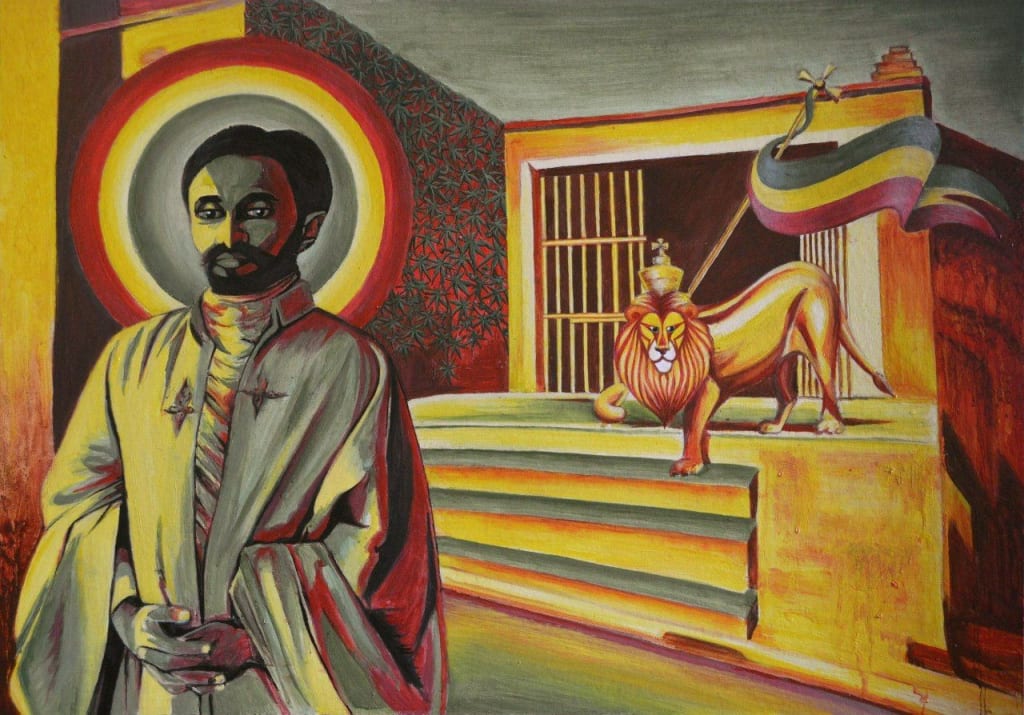Who is Jah in the Bible?
Exploring the Significance of Jah, His Role in Christian Theology, and Popular Misconceptions

Jah is an important figure in the Bible, revered by many as a powerful and merciful God. Understanding who Jah is and his significance in the Bible is essential for anyone seeking to deepen their understanding of the religious and cultural traditions that have been shaped by the Bible. Moreover, Jah's name and attributes are frequently referenced in popular music, literature, and art, making it even more crucial to comprehend the meaning and relevance of Jah in the Bible.
Jah is one of the many names and titles attributed to God in the Bible. In Hebrew, the name "Jah" means "I am" or "the existing one," and it is often used in conjunction with other names and titles of God, such as "Jehovah" or "Adonai." Jah's significance in the Bible can be seen throughout both the Old and New Testaments, where he is portrayed as a powerful and compassionate God who has intervened in human history to redeem his people.
Who is Jah in the Bible?
Jah is one of the many names used to refer to God in the Bible, particularly in the Hebrew scriptures. The word "Jah" is derived from the Hebrew word "Yah" which means "I am" or "existing one." It is often used in combination with other names and titles of God, such as "Jehovah" or "Adonai."
Examination of the various names and titles attributed to Jah in the Bible
In addition to Jah, God is referred to by a variety of names and titles in the Bible, each of which carries a unique meaning and significance. Some of the most commonly used names and titles for God in the Bible include "Elohim," "El Shaddai," "Yahweh," "Abba," and "Father." These names and titles help to describe different aspects of God's character and nature, and are used to convey different emotions and attitudes in prayer and worship.
Analysis of Jah's role in the Old Testament and New Testament
Jah's role in the Old and New Testaments is central to the Bible's message of redemption and salvation. In the Old Testament, Jah is portrayed as the creator and sustainer of all life, the God of the Israelites, and the one who delivered them from slavery in Egypt. In the New Testament, Jah is revealed as the loving and merciful God who sent his son Jesus Christ to save humanity from sin and death.
Examples of how Jah is referenced in different parts of the Bible
Jah is referenced throughout the Bible in various forms, such as "Jah," "Jehovah," "Adonai," and "Lord." For example, in Psalm 68:4, it says, "Sing to God, sing praises to his name; lift up a song to him who rides through the deserts; his name is Jah; exult before him!" In Exodus 6:3, God reveals himself to Moses as "Jehovah," saying, "I appeared to Abraham, to Isaac, and to Jacob, as God Almighty, but by my name Jehovah I did not make myself known to them."
In the New Testament, the name "Jah" is not used as frequently as in the Old Testament, but the concept of God as the existing one is still present. In John 8:58, Jesus says, "Truly, truly, I say to you, before Abraham was, I am." This statement reveals Jesus' divinity and his oneness with Jah, the God of the Old Testament.
Jah's significance in Christianity
Jah, also known as Yahweh or Jehovah, is a significant figure in Christian theology and worship. Christians believe in one God, who exists in three persons: the Father, the Son (Jesus Christ), and the Holy Spirit. Jah is identified as the Father, the first person of the Trinity, and is regarded as the source of all creation and the ultimate authority over all things.
Examination of Jah's importance in Christian theology
Jah's importance in Christian theology can be seen in the many references to his name and attributes in the Bible, particularly in the Old Testament. Christians believe that God revealed himself to humanity through the Scriptures and that Jah's character and nature are revealed through his interactions with his people in the Old Testament. Moreover, Jah's role in the New Testament as the Father of Jesus Christ is central to the Christian message of salvation, which teaches that God sent his son to redeem humanity from sin and death.
Analysis of how Jah is portrayed in Christian teachings and traditions
In Christian teachings and traditions, Jah is portrayed as a loving and merciful God who desires a personal relationship with his people. Christians believe that Jah is not only powerful and just but also compassionate and forgiving, and that he is intimately involved in the lives of his followers. Furthermore, Jah's nature is often described using various metaphors, such as a shepherd, a father, and a king, which help to convey different aspects of his character.
Explanation of how Jah relates to the concept of the Holy Trinity
Jah's role as the Father in the Holy Trinity is crucial to Christian theology, as it represents the source of all creation and the ultimate authority over all things. Christians believe that the Father, Son, and Holy Spirit are all distinct persons, but also one God, and that Jah's relationship with the other members of the Trinity is one of love and unity.
Examples of how Jah is worshipped in different Christian denominations
Jah is worshipped in various ways in different Christian denominations. Some churches may use the name "Jehovah" in their worship services, while others may use other names and titles for God. Some Christian traditions, such as the Catholic Church, emphasize the importance of praying to the Father through Jesus Christ, while others place more emphasis on personal prayer and individual relationships with God. Additionally, many Christian churches incorporate music and hymns that reference Jah's name and attributes, as a way of praising and worshipping him.
Popular misconceptions about Jah in the Bible
Despite the significant role Jah plays in Christian theology, there are still many popular misconceptions about his character and nature. These misconceptions can arise from misunderstandings of the Bible and its teachings, as well as from cultural and historical factors. Examining these misconceptions is important for gaining a more accurate understanding of Jah and his significance in Christian beliefs and practices.
Examination of common misunderstandings about Jah
One common misunderstanding about Jah is that he is a harsh and punishing God who is quick to anger and judgment. This view often stems from a literal interpretation of some Old Testament passages, which depict Jah as a vengeful God who punishes sinners. However, this view fails to take into account the broader context of the Bible and the teachings of Jesus Christ, which emphasize God's love, mercy, and forgiveness.
Another common misconception is that Jah is exclusively the God of the Old Testament, while Jesus Christ represents a different and more compassionate God in the New Testament. This view overlooks the continuity between the Old and New Testaments and fails to recognize that both Jah and Jesus Christ represent the same God of love and salvation.
Analysis of how these misconceptions arose
These misconceptions about Jah can arise from a variety of factors, including cultural and historical biases, as well as misunderstandings of the Bible and its teachings. For example, the harsh portrayal of Jah in some Old Testament passages may reflect the cultural context of the time, where violence and punishment were more common forms of justice. Similarly, the emphasis on Jesus Christ's love and compassion in the New Testament may reflect the need to counteract some of the negative views of God that had arisen in the Old Testament.
Explanation of why it's important to clarify these misconceptions
Clarifying these misconceptions is important for gaining a more accurate understanding of Jah and his significance in Christian beliefs and practices. Misunderstandings of God's character and nature can lead to fear, confusion, and even rejection of the Christian faith. By clarifying these misconceptions, Christians can deepen their faith and gain a greater appreciation for the love, mercy, and forgiveness of God.
Examples of how these misconceptions have impacted religious beliefs and practices
These misconceptions about Jah have had a significant impact on religious beliefs and practices. For example, some Christian traditions emphasize fear and punishment as a way to motivate people to obey God, rather than emphasizing God's love and mercy. Similarly, some Christians may view the God of the Old Testament as a different and more judgmental God than the God of the New Testament, leading to a lack of continuity and understanding between the two parts of the Bible. By clarifying these misconceptions, Christians can gain a more holistic and accurate understanding of Jah and his significance in Christian theology and worship.
Conclusion
Understanding who is Jah in the Bible is crucial for gaining a deeper understanding of Christian theology and beliefs. Jah's role in both the Old and New Testaments, as well as his significance in Christian worship and traditions, underscores the importance of studying and learning about this key figure in the Bible.
As we have seen, misconceptions about Jah can lead to misunderstandings of God's character and nature, and can impact religious beliefs and practices. By clarifying these misconceptions and gaining a more accurate understanding of Jah, Christians can deepen their faith and appreciation of God's love, mercy, and forgiveness.
Moreover, understanding Jah's significance extends beyond religious contexts, as his influence can be seen in many aspects of culture and history. From music to art to social justice movements, Jah's impact is far-reaching and enduring.
Therefore, I encourage readers to continue learning about who is Jah in the Bible and related topics. Through study and reflection, we can gain a deeper appreciation of Jah's role in Christian theology and the broader impact of his teachings on our world.
Final Note
If you’re interested in exploring the Jah Rastafari movement further, we invite you to check out Fifth Degree’s collection of Rastafarian clothing. Our clothing is designed to reflect the spirit and teachings of Rastafarianism, with bold colors, empowering messages, and a commitment to sustainability and ethical production. We believe that what you wear can be a powerful expression of your values and beliefs, and we’re proud to offer a range of high-quality, stylish, and socially conscious clothing for individuals who are seeking to live in harmony with nature and the divine. Visit our website today to learn more about our collection and find the perfect Rastafarian clothes for woman for you.
About the Creator
Enjoyed the story? Support the Creator.
Subscribe for free to receive all their stories in your feed. You could also pledge your support or give them a one-off tip, letting them know you appreciate their work.






Comments
There are no comments for this story
Be the first to respond and start the conversation.